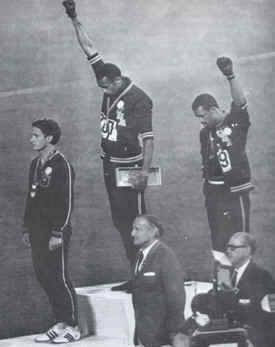 |
Peter Norman came second in the legendary 200m final that was to dominate the history of the 1968 Mexico Olympic Games. Peter Norman, then a 26-year old Australian athlete, ran a national record of 20.06 seconds for the distance; an Australian national record that stands to this day. However, while most would remember the drama that surrounded Tommy Smith and John Carlos during the medal ceremony, the actions of Norman in the lead up to the ceremony led Smith to comment later that while Norman had not raised a fist he did lend a hand.
As all three athletes made their way from the holding room to the tunnel at the Mexico Olympics Stadium waiting to be led to the rostrum to receive their medals, Norman noted that Smith had taken off his trainers and was waiting in black socks while Carlos was wearing a long line of beads around his neck that lay over his tracksuit top. Norman asked what they were doing. They informed Norman that they were protesting about the plight of Black Americans in the US and that the bare socks represented poverty and the beads represented all those who had been lynched fighting for their rights.
In response to their answer, Norman, who opposed his government’s ‘White Australia’ policy, asked a nearby American athlete if he could wear his Olympic Project for Human Rights badge as a show of support for both Smith and Carlos and for the plight of the Black Americans. Both Smith and Carlos also wore the badge. It was Norman who suggested that both men should wear just one black glove brought to the ceremony by Smith – Carlos had left his at the Olympic village – which explains why one had a gloved right fist raised and one a gloved left fist.
While the world focussed on Smith and Carlos for the raised fist salute, few noticed the badge worn by the silver medallist. It was Smith and Carlos who were booed by the audience at the stadium and not Peter Norman. However, after the medal ceremony, what Norman had worn above his national emblem on his tracksuit was more closely analysed by the Australian authorities in Mexico. Once it became obvious what it was and what it represented, they deemed that he was guilty of making a political statement at what was meant to be an apolitical event. Unlike Smith and Carlos, Norman was allowed to stay in Mexico but the Australian media made it clear that they expected him to be punished once the team had returned home, as they believed that he had violated the non-political status of the Olympics.
Shortly after the Mexico Games, Norman said:
“I believe every man is born equal and should be treated that way.”
This belief very much fitted in with his background that included an involvement in the work of the Salvation Army.
Despite pressure from the media, Norman only received a reprimand from the Australian athletics authority. He continued to involve himself in athletics and competed in the trials for the 1972 Munich Olympics.
Norman was still one of Australia’s fastest sprinters at the trials but was not chosen to represent his nation at the Munich Olympics despite being ranked 5th in the world’s sprinting ranks. After this, Norman retired from international athletics and took up football.
During a training session he seriously injured his Achilles tendon and nearly had to have a leg amputated because gangrene had set in. The injury ended any form of sport for Norman and he became depressed and turned to alcohol – a situation that took three years to resolve.
Both Smith and Carlos were welcomed to the 1996 Atlanta Olympics as guests of the American athletics authority, which finally recognised the part played by both men in the Civil Rights movement of the 1960’s. Their iconic salute was voted the sixth most memorable non-war incident of the C20th.
In 2000 the Olympics were held in Sydney. Peter Norman was invited to meet the US track and field squad and was greeted by Ed Moses, one of the world’s greatest hurdlers, and by world record holder Michael Johnson who told Norman to his face “you are my hero”.
Peter Norman died of a heart attack on October 3rd 2006 and the US Track and Field Federation named October 9th 2006 (the day of his funeral) ‘Peter Norman Day’. Two of the men who carried Norman’s coffin to his final resting place were Tommy Smith and John Carlos. In his eulogy, Smith said that Norman was “ a man of solid beliefs, a humanitarian.” John Carlos simply said, “Peter Norman was my brother”.